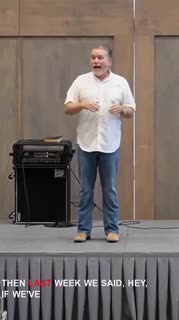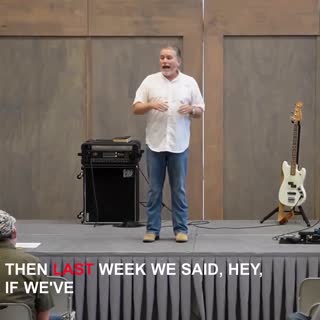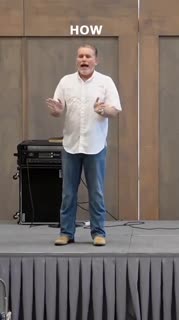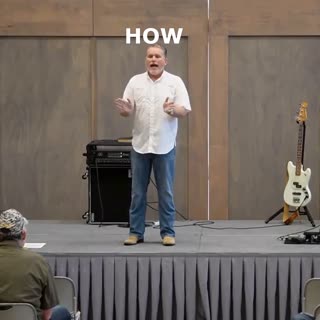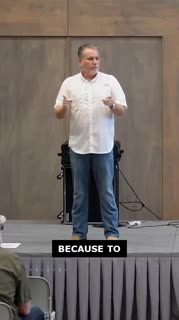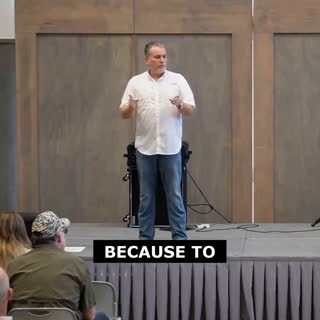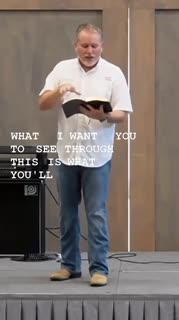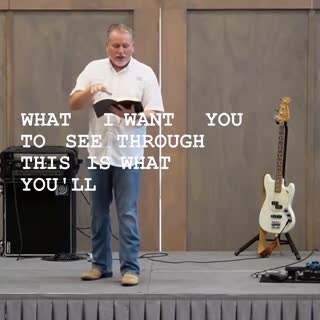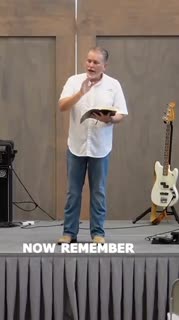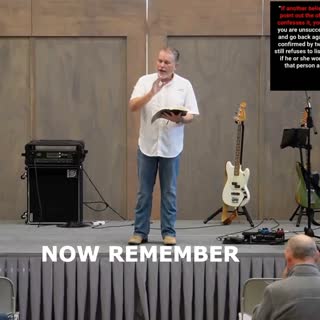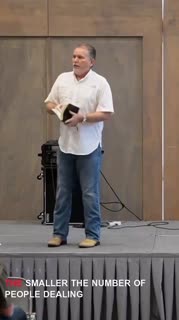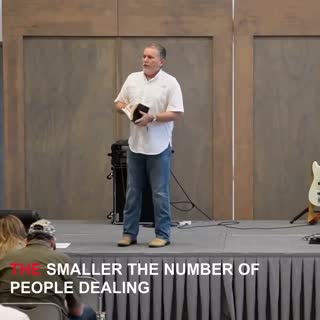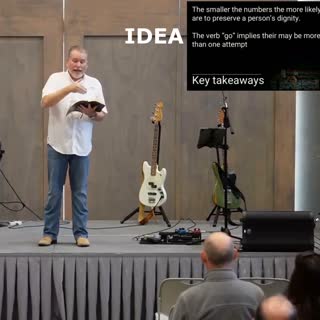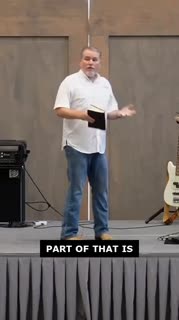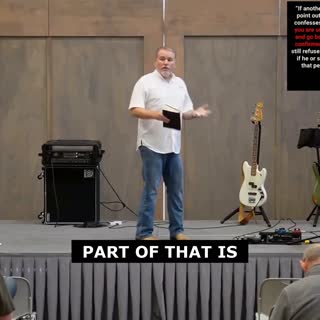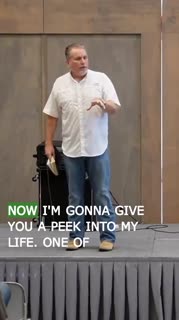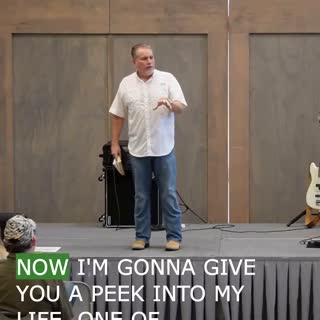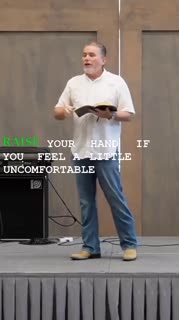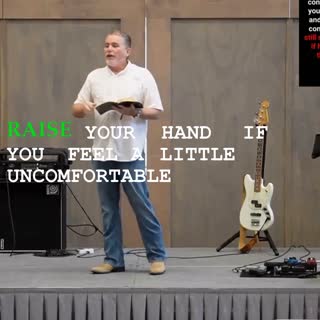Resolving Conflict with Love and Wisdom
Devotional
Sermon Summary
Bible Study Guide
Sermon Clips
"Then last week we said, hey, if we've got to engage in conflict, we've got to start with me. I've got to get the log out of my eye, Jesus said, before I address the speck in someone else's. If there's a problem, almost always, not always, but almost always, I have a piece of it too, right? And so I've got to handle my part of the conflict. I've got to apologize. I've got to take care of my business. I've got to take care of my amends before I engage with someone else. And then we come to week three, the final week. We're going to look at a process that Jesus gives us to walk through conflict. But what I want you to take away, I hope you'll take away the process, but what I want you to take away is an overarching principle that was found in all three weeks." [00:03:02] (45 seconds)
"But how we choose to resolve it, the path we walk down makes all the difference in the world. Let me just give you an example like out of the business world about paths. Air Canada, that is their American Airlines, one of the major transportation companies in Canada. They, as a company, want to make money. They want to make money. They want to make profits. Just like us, we want to resolve conflict, right? They want to make money, but how they make money, the path they choose to get there makes all the difference in the world. Air Canada made the decision to reduce costs. And one of the ways they went to reduce costs was they said, hey, we're going to get rid of the vast majority of our customer service department. We don't need customer service if we have AI chatbots." [00:03:59] (44 seconds)
"Because to resolve conflict, you're going to go one way or the other. You're either going to win the fight and win the argument, win the conflict, or you're going to win people. And you make the decision, as well as I do, which path we're going to walk down. Now, we're going to be in Matthew chapter 8." [00:06:50] (15 seconds)
"What I want you to see through this is what you'll see all the way through this passage. Once we dig into it, it is not about a policeman coming to look for someone who's done something wrong that we can throw in jail. The heart is not that I'm coming to find you and somebody did something wrong and we got to get all the messy people out here. It's the heart of a physician who says, hey, I see some sickness in the body and we need to address it because it's best for all of us, including you, that we address it. And we're going to address it together, believer to believer, follower to Jesus to follower to Jesus, because we all agree that Jesus is Lord. And we all agree that even though we're a messy church, we're not going to for messy people, that Jesus doesn't want to leave us in our mess. And so Jesus gives us a plan." [00:10:25] (46 seconds)
"Now remember we're talking about you can win fights or win people. Here's the key. If the other person listens and confesses it, you have won that person back. You hear the heart of Jesus? It's not like I'm going to go and I'm going to talk to you and I'm going to prove to you that I'm right. No, the heart is that we are walking with Jesus together. The point here in this or somebody has done something wrong. They've sinned and it's created some conflict. And so I'm going to go to you not because I want you to know I've been wronged and I want restitution and I want the men. I'm going because I love you and I want you to walk with Jesus closer." [00:11:54] (37 seconds)
"The smaller the number of people dealing with the conflict, the more likely the person's dignity stays intact. Right? So if someone is wrong and all of a sudden me and my four friends roll up on you and go, hey, we can do this. We can do this. We can do this. We got to have a conversation. Like you may not even know you offended somebody. You may not even know you made a mistake. You may not even know that you sinned. You may not have known that you hurt me. And when four people show up knocking on your door, hey, we got to talk. How does that make you feel? Like all of a sudden the defenses come up, right? The purpose of one -to -one, there's some dignity involved because I love you. I'm not trying to come as the policeman and throw you in jail because I love you. I'm just coming to you and I want your dignity intact. I'm not coming. I'm not telling anybody else." [00:12:37] (43 seconds)
"That's the idea of that verb, that you go continually. It's not just a checklist because I'm a policeman and before I get them, I got to make sure I've got all my bases covered, right? No, because I love you. I want to engage in a relationship with you because I want you to be right before God and I want to be right before God and I want us to have no conflict. I want us to have a resolution that glorifies God because we are both followers of Jesus. Here's the third kind of takeaway out of this. Jesus says, go. And he says, privately. Privately means privately." [00:14:26] (31 seconds)
"Part of that is that if it escalates to something bigger, it's not just he said, she said. There's some other witnesses involved. Now, when we're bringing other people in, it does not change the bottom line. Am I trying to win the fight or win people? I'm bringing another person with me or another two people because I love you. and we cannot get over this and I want us to and I want us to do it well and when I bring two other people with me or another person, it also brings wisdom into the mix. It does give kind of, hey, we've got some objective viewpoints to have some deeper conversations if we have to have it if the conflict continues to escalate." [00:16:12] (42 seconds)
"Now I'm gonna give you a peek into my life. One of the things that I will always do for you, as a messy church for messy people, I will tell you unequivocally, my life's a mess. I'm trying to follow Jesus just like you but I never want people to think, oh, Brett's life is perfect. Oh, he's the pastor, he's on the stage because you elevate me off the stage and all of a sudden, I hurt your feelings. It's a long fall from the top of the pedestal. I'm trying to walk with Jesus just like you guys are. I have conflicts just like you do. Amanda and I, my wife, had conflict this Christmas holiday. We're wrestling through kind of our new paradigm, having planted a church. My weekends look different than they did before. Well, her family, has a Christmas experience with her dad's side of the family and they meet in Granbury, Texas. They do it on a Saturday and it's kind of like, it's usually the Saturday right before Christmas. It's locked on the calendar. Everybody knows, people come all in and we go every year. Well, it just so happens that Amanda's mom lives about 30 to 45 minutes from her dad's Christmas." [00:17:52] (66 seconds)
"Raise your hand if you feel a little uncomfortable right now, right? Like, you know how many churches just like, I never saw that. Like, I don't even want to talk about it, because it's just that, that level of conflict is so uncomfortable. But let me set the stage so you can understand, because remember, we're choosing to win fights or win people. When Jesus is saying this, there's literally not even a church. The church is coming after Jesus's death and resurrection. And when the church begins, the churches are small. They're more like house churches. Like, we would be planting, I mean, we're 11 months old, and we're significantly bigger than an early church." [00:22:45] (38 seconds)
